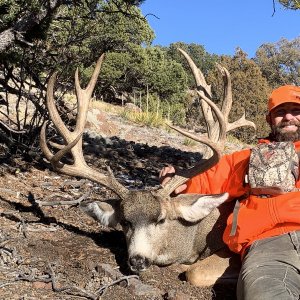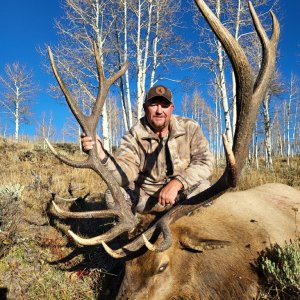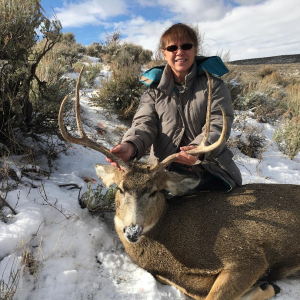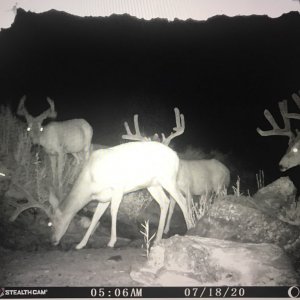M
manny15
Guest
June 26, 2009
RE: Offense Campaign Strategy and Need
Since January, Conservation Force has filed 19 federal complaints, many containing four to five separate legal claims, from San Francisco to Washington, D.C. We may need to double that number before the year is out. There is nothing in American conservation history that matches it, nor is there ever again likely to be an equal. It is the most direct, definitive, important fight to save international hunting and related conservation that has ever taken place and on a scale never before imagined.
The creeping losses of hunting have been staggering and are now undeniable. They can't lie to us anymore. Such a massive loss of hunting on so many fronts without the very best fight we can make is not an option.
So, what is all of this about? An unwritten U.S. policy has evolved against using hunting as a conservation tool. The practices growing out of that policy fly in the face of the modern concept of sustainable use and all it stands for. This is the fourth Administration to knowingly refuse to issue enhancement permits even for the best, most renowned conservation projects in the world. Not one permit.
That is not all. Port inspectors and Interior Department Solicitors have adopted an attitude that trophy importation is unfavored trade that should be suppressed. Today trophies are seized whenever there is the smallest clerical mistake without any consideration of the value of the trophy, or of the benefits of the trade. There is an increasing trend towards seizure and forfeiture in defiance of protective legislation passed by Congress, such as the innocent owner defense and proportionality tests. They treat hunters like criminals and trophies as forbidden "contraband." This is all unrelated to the legality of the hunt or the authenticity of the trophy and demonstrates absolute contempt for the underlying conservation benefits of the hunting. It has taken far too long to discern the enormity of the problem and the impact it is having on hunters, hunting and everything related to and dependant on hunting. It must be stopped now, not tomorrow.
In another policy against hunting, in September 2007 the wholly independent USF&WS International Affairs section codified 100 pages of internal CITES regulations of which many parts were first suggested by animal rights organizations averse to all "recreational hunting." The Service represented that they were merely implementing longstanding CITES resolutions, but instead they codified regulations that defy CITES resolutions intended to further hunting. We are challenging those regulations head on in the seizure cases across America.
One of those regulations now mandates that the USF&WS make its own biological and management findings before accepting CITES quotas adopted by the 177 nations at Conferences of the Parties or exporting countries' findings. This is proving to be a far greater barrier to imports and a burden on foreign programs and hunters than some might think. Those USF&WS divisions have an attitude that trophy import applications are "a low priority," that it is "disfavored trade that normally should not be permitted," and that they are "a regulatory branch of the Service, not a public service or a unit with such management concerns." The custom and practice is to stall, delay and discourage such permits. It is a policy against hunting and hunting-based conservation that we can no longer afford to ignore. These regulations are nails in our coffin.
One of the startling wake-up calls was the polar bear listing. Our government expressly stated that it could not take into account the conservation benefits of the Canadian hunting program and, worse, could not even consider the "efficacy" of the listing. Then, when we tried to save the trophies trapped in Canada, the Oakland Federal Judge held that she had considered the hunters' interest in their trophies already taken but accorded it no weight. (I will argue that before the 9th Circuit Court of Appeals sitting in Alaska on August 5.) The government lawyers argued and the Oakland Judge pronounced that the hunters merely needed to apply for enhancement permits under a different provision of the MMPA. Well, we filed those permits for the very best possible population and they were outright denied. That necessitated a third polar bear suit. This is not about just the polar bear. Hunting has been wholly removed from the conservation equation when it has proven most important, and with it, the personal interest of hunters has been wholly disregarded. We can't let this precedent go unchallenged. It is clear that no one will act for us.
All our options have failed and we have no time for hesitation. We must reverse the momentum against hunting as a conservation tool to hold on to what we have. All other options have been exhausted. Some battles have already been lost before we went on the offensive, such as the importation of cheetah and the millions of dollars of seized trophies that have been forfeited. It is time to apply the force of law before the largely unwritten policies and practices become more imbedded.
We did not pick the time as this offensive is the last resort, but we are smartly picking the cases and issues as we have had "smart" conservation projects in the past.
So what is so important about the markhor suit? I'll never hunt straight-horned markhor, neither will most of you, but it is the best test case. Believe me, if we can't win that suit, we can't win any. For more reasons than can be listed here, it is the most perfect case. Decades of work and strategic planning have determined that this is the best case to demonstrate the grievances. International Affairs of USF&WS has undeniably admitted in the Federal Register that the ESA is obstructing the program, that it is hunting-based and hunting has caused a "significant increase" in the markhor population (more than 20-fold) and the program warrants special trophy import treatment (import permits). It is the most renowned, award-winning, hunting-based sustainable use program in the modern world - probably ever. Naseer Tareen and STEP have joined us in the suit. Naseer heads the regional IUCN Sustainable Use Specialist Group and the Society for Torghar Environmental Protection (STEP) which operates the Torghar Hills program that filed the downlisting petition. This is as much a breakthrough as when we were able to get the Inuvialuit Game Council to join in the polar bear suit and when we represented Mongolia and Tajikistan in the argali suit in the past.
While the markhor (and wood bison) is the best possible hope for legal enforcement of ESA enhancement permits and all that could mean, the elephant suits are the best to challenge the adverse attitude towards import of CITES Appendix I listed species. The delay and denial of elephant import permits is because International Affairs insists upon making its own biological findings while contradictorily treating such permits as low priority. Both violate the written stipulation to the elephant suit we won in the 1990s. In Mozambique they took 10 years to process the permits and could not make a non-detriment finding when it was only two trophies per year even though those two were in a project area developed by CAMPFIRE leaders to emulate that program. There was no action in four years on applications for the Niassa Reserve, which is one of the most promising programs in the world.
We've had to send a notice of intent to sue because of the delay in processing Tanzania permit applications. It has the second largest elephant population in the world, but for the second consecutive year permit applications are too low a priority for the USF&WS to make all the self-imposed biological findings until after the hunting season is over. We were only going to sue for Mozambique, but that case has been allotted to the Chief Judge that heard the 1990s elephant suit and the stipulation the Service is now ignoring that it would not behave like this again. In July, when we file the Tanzania and Zambia elephant suits, they will be allotted as related cases to that same judge who should take a dim view of the violation of the stipulation in his earlier case. We are also working diligently to downlist the elephant of Mozambique, Tanzania and Zambia to Appendix II with an annotation that it is for trophy hunting trade only - then no import permits will be necessary at all. That CoP is scheduled for next March. In the meantime, we will be using these elephant to overturn the Service's illegal CITES scientific review requirements codified in September 2007 that apply to all Appendix I species.
The same smart selection is being made with the seizure cases. We are filing court claims when the trophy owners are innocent of any wrongdoing, such as when an airline loses the CITES documents and when the exporting government makes a clerical or technical mistake. Until now, trophies were routinely forfeited in those cases.
The litigation blitz is costing Conservation Force $13,000 per month for paralegal assistants and $3-4,000 per month in court-related out-of-pocket expenses. Believe me, we run a tight ship because this will get bigger with motions and interventions before it gets better. If we don't do enough, the losses are likely to be forever.
Simultaneously, we are dealing effectively with other crises as they arise. We are doing all we can to prevent the African lion from being listed on Appendix I of CITES, to maintain argali hunting, particularly in Mongolia, to facilitate ownership and conservation of listed exotics in Texas, and to protect the right to travel with firearms. These are the most pressing crises of the moment and we are on top of it all.
No half-hearted commitments, no flinching. It is time to be a force to be reckoned with; the force of the law. Contributing to Conservation Force right now is one of the most important things you will ever do. It is showdown time. One of the most definitive times in history. You will not see anything like it again. Please help.
Thank you,
John J. Jackson, III
President, Conservation Force
RE: Offense Campaign Strategy and Need
Since January, Conservation Force has filed 19 federal complaints, many containing four to five separate legal claims, from San Francisco to Washington, D.C. We may need to double that number before the year is out. There is nothing in American conservation history that matches it, nor is there ever again likely to be an equal. It is the most direct, definitive, important fight to save international hunting and related conservation that has ever taken place and on a scale never before imagined.
The creeping losses of hunting have been staggering and are now undeniable. They can't lie to us anymore. Such a massive loss of hunting on so many fronts without the very best fight we can make is not an option.
So, what is all of this about? An unwritten U.S. policy has evolved against using hunting as a conservation tool. The practices growing out of that policy fly in the face of the modern concept of sustainable use and all it stands for. This is the fourth Administration to knowingly refuse to issue enhancement permits even for the best, most renowned conservation projects in the world. Not one permit.
That is not all. Port inspectors and Interior Department Solicitors have adopted an attitude that trophy importation is unfavored trade that should be suppressed. Today trophies are seized whenever there is the smallest clerical mistake without any consideration of the value of the trophy, or of the benefits of the trade. There is an increasing trend towards seizure and forfeiture in defiance of protective legislation passed by Congress, such as the innocent owner defense and proportionality tests. They treat hunters like criminals and trophies as forbidden "contraband." This is all unrelated to the legality of the hunt or the authenticity of the trophy and demonstrates absolute contempt for the underlying conservation benefits of the hunting. It has taken far too long to discern the enormity of the problem and the impact it is having on hunters, hunting and everything related to and dependant on hunting. It must be stopped now, not tomorrow.
In another policy against hunting, in September 2007 the wholly independent USF&WS International Affairs section codified 100 pages of internal CITES regulations of which many parts were first suggested by animal rights organizations averse to all "recreational hunting." The Service represented that they were merely implementing longstanding CITES resolutions, but instead they codified regulations that defy CITES resolutions intended to further hunting. We are challenging those regulations head on in the seizure cases across America.
One of those regulations now mandates that the USF&WS make its own biological and management findings before accepting CITES quotas adopted by the 177 nations at Conferences of the Parties or exporting countries' findings. This is proving to be a far greater barrier to imports and a burden on foreign programs and hunters than some might think. Those USF&WS divisions have an attitude that trophy import applications are "a low priority," that it is "disfavored trade that normally should not be permitted," and that they are "a regulatory branch of the Service, not a public service or a unit with such management concerns." The custom and practice is to stall, delay and discourage such permits. It is a policy against hunting and hunting-based conservation that we can no longer afford to ignore. These regulations are nails in our coffin.
One of the startling wake-up calls was the polar bear listing. Our government expressly stated that it could not take into account the conservation benefits of the Canadian hunting program and, worse, could not even consider the "efficacy" of the listing. Then, when we tried to save the trophies trapped in Canada, the Oakland Federal Judge held that she had considered the hunters' interest in their trophies already taken but accorded it no weight. (I will argue that before the 9th Circuit Court of Appeals sitting in Alaska on August 5.) The government lawyers argued and the Oakland Judge pronounced that the hunters merely needed to apply for enhancement permits under a different provision of the MMPA. Well, we filed those permits for the very best possible population and they were outright denied. That necessitated a third polar bear suit. This is not about just the polar bear. Hunting has been wholly removed from the conservation equation when it has proven most important, and with it, the personal interest of hunters has been wholly disregarded. We can't let this precedent go unchallenged. It is clear that no one will act for us.
All our options have failed and we have no time for hesitation. We must reverse the momentum against hunting as a conservation tool to hold on to what we have. All other options have been exhausted. Some battles have already been lost before we went on the offensive, such as the importation of cheetah and the millions of dollars of seized trophies that have been forfeited. It is time to apply the force of law before the largely unwritten policies and practices become more imbedded.
We did not pick the time as this offensive is the last resort, but we are smartly picking the cases and issues as we have had "smart" conservation projects in the past.
So what is so important about the markhor suit? I'll never hunt straight-horned markhor, neither will most of you, but it is the best test case. Believe me, if we can't win that suit, we can't win any. For more reasons than can be listed here, it is the most perfect case. Decades of work and strategic planning have determined that this is the best case to demonstrate the grievances. International Affairs of USF&WS has undeniably admitted in the Federal Register that the ESA is obstructing the program, that it is hunting-based and hunting has caused a "significant increase" in the markhor population (more than 20-fold) and the program warrants special trophy import treatment (import permits). It is the most renowned, award-winning, hunting-based sustainable use program in the modern world - probably ever. Naseer Tareen and STEP have joined us in the suit. Naseer heads the regional IUCN Sustainable Use Specialist Group and the Society for Torghar Environmental Protection (STEP) which operates the Torghar Hills program that filed the downlisting petition. This is as much a breakthrough as when we were able to get the Inuvialuit Game Council to join in the polar bear suit and when we represented Mongolia and Tajikistan in the argali suit in the past.
While the markhor (and wood bison) is the best possible hope for legal enforcement of ESA enhancement permits and all that could mean, the elephant suits are the best to challenge the adverse attitude towards import of CITES Appendix I listed species. The delay and denial of elephant import permits is because International Affairs insists upon making its own biological findings while contradictorily treating such permits as low priority. Both violate the written stipulation to the elephant suit we won in the 1990s. In Mozambique they took 10 years to process the permits and could not make a non-detriment finding when it was only two trophies per year even though those two were in a project area developed by CAMPFIRE leaders to emulate that program. There was no action in four years on applications for the Niassa Reserve, which is one of the most promising programs in the world.
We've had to send a notice of intent to sue because of the delay in processing Tanzania permit applications. It has the second largest elephant population in the world, but for the second consecutive year permit applications are too low a priority for the USF&WS to make all the self-imposed biological findings until after the hunting season is over. We were only going to sue for Mozambique, but that case has been allotted to the Chief Judge that heard the 1990s elephant suit and the stipulation the Service is now ignoring that it would not behave like this again. In July, when we file the Tanzania and Zambia elephant suits, they will be allotted as related cases to that same judge who should take a dim view of the violation of the stipulation in his earlier case. We are also working diligently to downlist the elephant of Mozambique, Tanzania and Zambia to Appendix II with an annotation that it is for trophy hunting trade only - then no import permits will be necessary at all. That CoP is scheduled for next March. In the meantime, we will be using these elephant to overturn the Service's illegal CITES scientific review requirements codified in September 2007 that apply to all Appendix I species.
The same smart selection is being made with the seizure cases. We are filing court claims when the trophy owners are innocent of any wrongdoing, such as when an airline loses the CITES documents and when the exporting government makes a clerical or technical mistake. Until now, trophies were routinely forfeited in those cases.
The litigation blitz is costing Conservation Force $13,000 per month for paralegal assistants and $3-4,000 per month in court-related out-of-pocket expenses. Believe me, we run a tight ship because this will get bigger with motions and interventions before it gets better. If we don't do enough, the losses are likely to be forever.
Simultaneously, we are dealing effectively with other crises as they arise. We are doing all we can to prevent the African lion from being listed on Appendix I of CITES, to maintain argali hunting, particularly in Mongolia, to facilitate ownership and conservation of listed exotics in Texas, and to protect the right to travel with firearms. These are the most pressing crises of the moment and we are on top of it all.
No half-hearted commitments, no flinching. It is time to be a force to be reckoned with; the force of the law. Contributing to Conservation Force right now is one of the most important things you will ever do. It is showdown time. One of the most definitive times in history. You will not see anything like it again. Please help.
Thank you,
John J. Jackson, III
President, Conservation Force













